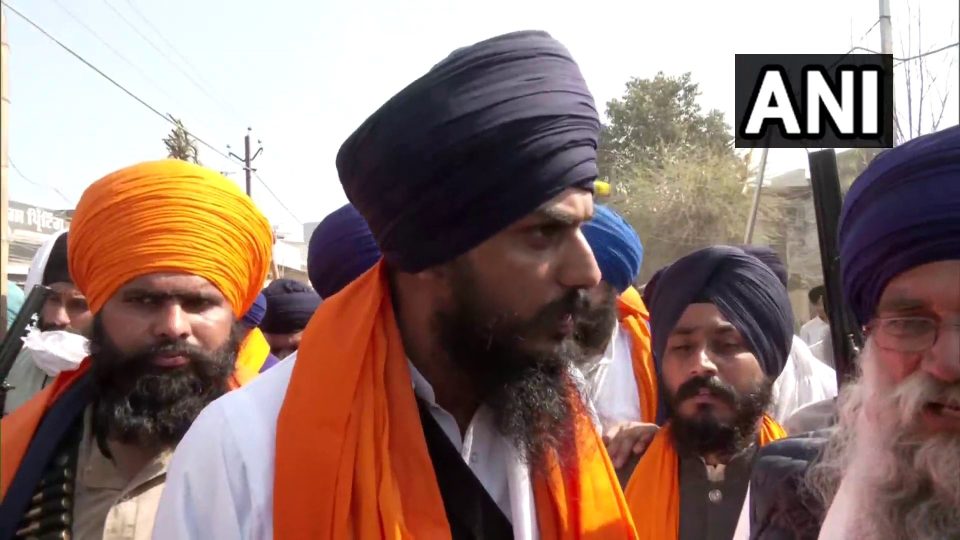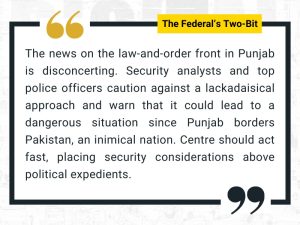
Is State power withering away? Alarm bells from Punjab and Haryana

Two recent episodes of mob action not only showed the State as failing miserably in its primary duty, but, paradoxically, also revived memories of an old Marxist concept, albeit in a different backdrop.
Friedrich Engels, in his book Anti-Dühring, a major addition to the elucidation and development of Marxist theory, introduced the concept of the ‘withering of the state’. Exploring the possible stage after the “proletariat seizes power” when all class distinctions get abolished, he propounded that after the “government of persons is replaced by the administration of things”, the State would wither away.

India is not even remotely anywhere near either the proletariat-seizing political power, or being anything akin to a socialist nation; those goals have become more distant in the past few years. However, two specific incidents have conspicuously shown the State in a withered state, or as a hollow bark of an otherwise all-enforcing and often unrelenting police apparatus.
The first of these two latest instances of the powerlessness of the State was when the Rajasthan Police was virtually prevented from conducting investigations, in the manner its officers initially wished to, into the alleged murder of two Muslim men from Bharatpur. The Rajasthan police failed in fulfilling its duty because of pressure from violent cow protection groups in Haryana.
These motley bands of people had actually put pressure on the State’s regime and the machinery in their control, to ensure that the alleged ringleader of the vigilante gang, Mohit Yadav aka Monu Manesar, was not arrested by Rajasthan Police. For the past few years, he was nominated by Haryana’s Bharatiya Janata Party government to the state-level Special Cow Protection Task Force Committee, a status he allegedly (mis)used to lead wanton acts of vigilantism.
Also Read: Rahul can be ‘tapasvi’; what Congress needs is labourers on its side
There was sufficient reason for the Rajasthan Police to at least interrogate Manesar but its team did not pursue what it set out to do when they entered Haryana.
Protective ring around Monu Manesar
This clearly was the consequence of the protective ring thrown around him by majoritarian groups that have taken control of mahapanchayats in the socially denuded tracts of Haryana where no sense exists of the neighbourhood being the home too for the non-threatening ‘other’ for several generations.
When word spread that they had dropped investigations against Manesar, the violent but iconic rabble-rouser, Rajasthan Police issued a hasty statement that investigations into the death of the two men were still underway, and no one had been issued a ‘clean chit’.
Also Read: Bhiwani deaths: Forensic report confirms charred bodies were of Junaid, Nasir
Even those uninitiated into the world of criminal investigations know that those named as suspects should be questioned at the earliest to ensure that evidence is not destroyed.
While in this episode the (Rajasthan) State displayed symptoms of withering away because of the Haryana machinery’s collaborative role with the vigilante groups now masquerading as State representatives, the incident in Punjab is far more serious.
Centre’s double standards?
But the ruling party at the Centre is guilty of adopting two standards. If it has animatedly condemned the episode in Punjab wherein Amritpal Singh’s close aide, Lovepreet Singh alias Toofan Singh, was released from police custody following coercive mob action, why has it been silent over the incident in Rajasthan-Haryana?
If the ‘nation’ gets threatened by anti-national separatists in Punjab, does not failure to curb vigilantism against Indian citizens have the potential to amplify internal security threats?
Also Read: Bhiwani deaths: Internet, SMS services suspended for 3 days in Haryana’s Nuh
The (Centre) State has let it be known through the media (read sources) that Amritpal Singh and his group’s rise is an effort on the part of Pakistan’s ISI to ferment fresh trouble in Punjab.
Undoubtedly, Punjab has a long history of the ‘foreign hand’ promoting anti-State activism and separatism in Punjab. There is every reason to be doubly cautious in this important border state, especially as Pakistan never really abandoned promoting groups that weakened the Indian State.
Neo-militancy in Punjab
But, the episode in Ajnala is not the first manifestation of neo-militancy in the state. Earlier in February, a protesting mob owing allegiance to Qaumi Insaf Morcha, which is seeking release of Sikh prisoners from jail, clashed with police and marched to the Punjab chief minister’s residence/office. When they dispersed, they carried along important police equipment, including ammunition.
This agitation is backed by the radical-minded in the community, besides the Shiromani Gurudwara Parbandhak Committee and uses the templates of the farmers’ strike. Even during the Punjab assembly elections in 2022, there was incessant chatter regarding the imminent re-emergence of militancy.
The Aam Aadmi Party government, led by Bhagwant Mann, needed to be particularly mindful of this murmur. However, it has not shown itself as a particularly efficient administration on matters regarding political agitations and other protest movements that bear a close resemblance to the militancy of yore. It will have to be particularly careful to prevent the situation from assuming alarming proportions.
These episodes now appear in the form of a throwback to the 1980s when Punjab was ravaged by Sikh separatism and terrorist violence. Significantly, the latest episode too was triggered by an alleged kidnapping. On the basis of the victim’s complaint, the police not just registered an FIR but also arrested Lovepreet Singh, Amritpal Singh’s aide.
This provided an opportunity to gain prominence to the September 2022 returnee from Dubai who also then formally assumed leadership of Waris De Punjab, the organisation sired by Deep Sidhu. While Amritpal Singh was already being spoken about in hushed tones in Punjab, this episode enabled him to get his name splashed in the media across India.
Holding not just the Ajnala police station but also the entire police machinery to ransom, Amritpal Singh secured the premature release of his aide and got the charges against him dropped.
State machinery failing?
Several other episodes have occurred in Punjab and other states where the police, as the representative of the State, have either come short or failed in their basic duties.
It is no secret that in certain episodes, the police have sided, tacitly at least, with the perpetrators of the act, which effectively prevented the State from performing its duty.
Worryingly, these incidents are those where the perpetrators were none else, but allegedly the vigilante arms of the country’s current political regime. Because of the character of most state police personnel, there exist subtle sympathies for political groups that fray the boundaries of the rule of law.
Also Watch: Violence in Amritsar is wake-up call for Punjab
Sikh militancy has been justified by showcasing the promotion of the objectives of the Hindutva votaries.
The BJP cannot expect to go tough on groups and individually erring policepersons in states where it is not in power and remain ‘soft’ or ‘understanding’ in states where it is not just in power, but also backs social groups who take law in their hands, like in Haryana and Uttar Pradesh.
If the State withers in one part of the country, its effect could well be spiralling and disastrous for the country.
(Nilanjan Mukhopadhyay is a NCR-based author and journalist. His last book was The Demolition and the Verdict: Ayodhya and the Project to Reconfigure India. He has also written The RSS: Icons of the Indian Right and Narendra Modi: The Man, The Times. He tweets at @NilanjanUdwin)

